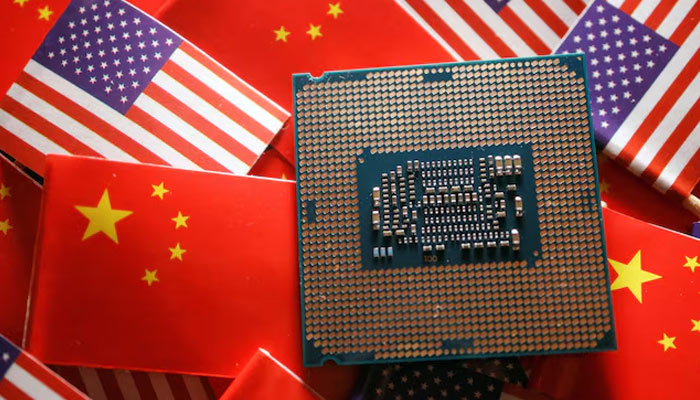
WASHINGTON: China’s retaliatory export control measures could take a toll on America’s growing clean energy sector and its defense industry, analysts say, as the trade fight intensifies between the two largest economies in the world.
Beijing announced this week that it would ban exports of gallium, germanium and antimony to the United States, targeting materials used in everything from semiconductors to solar cells.
China has also tightened restrictions on graphite, a key component of the electric vehicle industry.
The measures, which Beijing said were aimed at safeguarding national security, quickly followed moves by Washington to hamper China’s ability to manufacture advanced computer chips.
As trade tensions simmer, the arrival of US President-elect Donald Trump at the White House in January is likely to raise the temperature on trade – with the Republican already pledging to impose drastic tariffs on imports Chinese.
Analysts say it would take time to assess the impact of China’s new restrictions on U.S. industries, although any immediate impact is expected to be limited.
Some view Beijing’s steps as symbolic for now, although the consequences depend on how China enforces the new rules.
“It certainly could increase costs,” said Arun Seraphin of the National Defense Industrial Association. “This could create situations where you won’t be able to produce what you need.”
“This is certainly going to generate a lot of uncertainty for companies wanting to plan their supply chain,” he said. AFP.
China is a major producer of the three metals in question.
In August, he unveiled export controls on some antimony products and since then, shipments have plunged.
Restrictions announced in 2023 on gallium and germanium also hit exports to the United States.
Defense technology
“Gallium, germanium, and antimony are critical inputs for defense technologies,” said Gracelin Baskaran and Meredith Schwartz of the Center for Strategic and International Studies (CSIS) in a recent analysis.
Gallium and germanium are increasingly preferred over traditional silicon for high-performance chips used in defense applications, CSIS added.
He noted that these materials have properties that improve the performance, speed and energy efficiency of devices.
Antimony is used in fireproofing and also has defense-related uses.
While China is investing in munitions and purchasing high-end weapons systems faster than the United States, the U.S. industrial base lacks the capacity to meet defense technology production needs, report warns .
“Bans on vital mineral inputs will only allow China to outpace the United States in developing these capabilities,” he said.
The US Geological Survey estimates that if China’s net exports of gallium and germanium were completely restricted simultaneously, US GDP could decline by $3.4 billion.
Clean energy
Besides defense, gallium-based semiconductors are used in radio frequency electronics, LEDs for lighting and high-efficiency solar cells, the U.S. Geological Survey noted.
Although gasoline vehicles do not require graphite, electric vehicles (EVs) require an average of 136 pounds (61.7 kilograms) of graphite, CSIS said.
That could prove risky for the United States, which has spurred billions in private-sector investment for its domestic electric vehicle supply chain with subsidies through the Inflation Reduction Act.
The law is a package of energy transition policies and social reforms under President Joe Biden.
Seraphin said AFP that while Washington has also worked to attract investment and build U.S. semiconductor manufacturing capacity through the CHIPS and Science Act, these efforts are not yet targeting components such as germanium.
Challenges
Beijing’s retaliation this week strengthens restrictions on gallium and germanium announced in 2023 – as China retaliates against previous US controls on semiconductor exports.
“The industry was probably somewhat surprised by the speed with which a broader ban was imposed, but has been conditioned over the past year to expect some restrictions,” said Paul Triolo of the Albright Group Stonebridge. AFP.
He noted that China’s Ministry of Commerce already had a licensing regime in place for these key minerals, including “three-month renewable licenses to try to prevent stockpiling.”
Although there have been efforts to stockpile minerals like graphite and gallium, these efforts do not appear to be coordinated between U.S. officials and their allies to reduce their dependence on China in the long term.
It will be difficult to create processing and production capacity for products based on these minerals outside China, Triolo believes, due to costs and regulatory challenges.
“Companies are reluctant to enter these markets without guarantees of long-term subsidies, given the dominance of Chinese companies,” he said.
